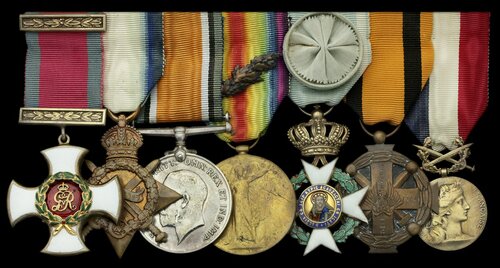
Auction: 21002 - Orders, Decorations and Medals
Lot: 222
A Great War D.S.O. group of seven awarded to Lieutenant-Colonel H. Garwood, Royal Garrison Artillery, a member of the 'Cairo Gang', he avoided assassination on the morning of 'Bloody Sunday', possibly by having spent the night in a brothel
Distinguished Service Order, G.V.R., silver-gilt and enamel, top riband bar adapted for mounting, central medallions depressed; 1914-15 Star (Capt. H. P. Garwood R.G.A.); British War and Victory Medals, with M.I.D. oak leaves (Major H. P. Garwood); Greece, Kingdom, Order of the Redeemer, 2nd type, Officer´s breast Badge, silver-gilt, gold centres and enamel, with rosette on riband; Greece, Kingdom, Medal of Military Merit; France, Third Republic, Medal of Honour, silver-gilt, with wreath and crossed swords suspension, mounted as worn, polished, nearly very fine (7)
D.S.O. London Gazette 1 January 1918.
Greece, Order of the Redeemer, 4th Class London Gazette 9 November 1918.
Greece, Medal for Military Merit London Gazette 24 October 1919.
France, Medal of Honour London Gazette 21 July 1919.
Henry Percy Garwood was born in April 1882, the son of Colonel J. F. Garwood, Royal Engineers, and was educated at Marlborough College and the Royal Military Academy, Woolwich. Commissioned 2nd Lieutenant in the Royal Artillery in August 1900, he was promoted Lieutenant in September 1902, and Captain in August 1913. He served during the Great War during operation in Greek Macedonia, Serbia, Bulgaria, European Turkey, the Islands of the Aegean, and Egypt, from July 1915. Promoted Major in December 1915, he was appointed Deputy Assistant Adjutant General (Staff Officer, Royal Artillery) with the Egyptian Expeditionary Force in August 1916; and Staff Officer to the General Officer Commanding, R.A., in Salonika from December 1917. He ended the Great War with a brace of 'mentions' (London Gazettes 21 June and 28 November 1917, refer) to go with his D.S.O., while he was promoted Brevet Lieutenant-Colonel in January 1919. Garwood was made December 1919 as Deputy Assistant Quarter Master General, Black Sea, stationed in Alexandria, a post he held until July 1920.
Cairo Gang
Posted to Dublin on "Special Duty GHQ" in July 1920, Garwood was almost certainly one of the 'Cairo Gang', a group of British intelligence agents, many of whom had served in the Middle East, who were sent to Dublin to conduct intelligence operations against prominent members of the Irish Republican Army. Living throughout the city, in a mixture of hotels and private houses, and officially known as Dublin District Special Branch, they prepared a list of targets. However, the Irish Republican Army Intelligence Department, under Michael Collins, was one step ahead of them, and was receiving information from numerous well-placed sources, including most of the Irish servants who worked in the houses where the officers lived, and all of their comings and goings were meticulously recorded and reported to Collins's staff. On the morning of Sunday 21 November 1920 - 'Bloody Sunday' - the I.R.A., in a series of coordinate house attacks orchestrated by Collins, assassinated 12 members of the Cairo Gang, along with one Royal Irish Constabulary policeman and a civilian informant. Garwood escaped the assassins- he may well be the Lieutenant-Colonel who is referred to in one source as having been away from his lodgings that morning, having spent the night in a Dublin brothel. In retaliation for the murders, the Royal Irish Constabulary, supported by members of the Auxiliary Division, opened fire later on that day on the crowd at a Gaelic football match at Croke Park, killing one of the players and thirteen spectators. The remaining Cairo Gang members, along with many other spies, fled to either Dublin Castle or England, fearing they were next on the I.R.A.'s hit list, dealing a severe blow to British intelligence-gathering in Ireland. Only one member of the I.R.A. was captured during the assassination operation. Court-martialled and sentenced to hang, he escaped from Kilmainham Gaol before the sentence could be carried out.
The Chanak Incident
Leaving Ireland after Bloody Sunday, Garwood was given the command of the Royal Artillery Contingent during the Chanak Incident, when the Turkish Army under Kemel Ataturk drove the Greek Army out of Smyna and advanced towards Anglo-French positions in the Dardanelles, in an attempt to regain territory that had been taken from the defeated Ottoman Empire after the Great War. Concerned that if the Turks crossed the Dardanelles neutral zone they would continue their campaign through Greece and into the Balkans, thereby triggering another World War, the British Government decided to fortify Chanak with the British garrison in the Dardanelles and threaten war with Turkey if she attacked. The French withdrew, leaving just a British force of 7,600 men to defend Europe. An Armistice was arranged, two hours before British troops were due to have attacked, and War was averted, but the incident resulted in the Conservatives (who already had a Parliamentary majority) withdrawing from coalition Government, leading to the resignation of Lloyd George as Prime Minister and the end of the Liberals as a dominant force in British politics. Returning to England, Garwood retired with the rank of Lieutenant-Colonel to Wimbledon in April 1928, and died in January 1956.
Subject to 20% VAT on Buyer’s Premium. For more information please view Terms and Conditions for Buyers.
Sold for
£3,800
Starting price
£2000




